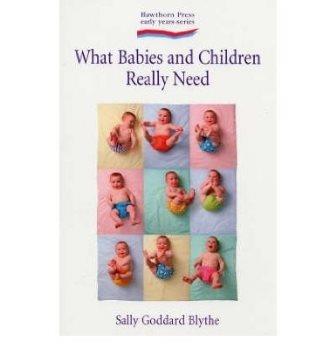
Although watching my son explore our local SureStart Centre can be fun, there is definitely a finite amount of time I can bear to spend watching him play with cars.
Recently, that time having long since expired, I found myself browsing the centre’s bookshelves and spotted Sally Goddard Blythe’s ‘What Babies and Children Rally Need’.
What’s it about?
Exactly what the cover says. In fact, Goddard repeats this phrase like a mantra whenever she feels she may have offended her readers: ‘Although this flies in the face of political correctness and what many people would like to hear, the purpose of this book is to write about what Children need, not what adults would like to do.’
Goddard insists that children benefit greatly from their mothers or fathers spending an absolute minimum of one year at home with their children after birth, ideally two or even three years.
So what do they need? In a nutshell, they need opportunities to move, to learn and to spend time with their parents giving them love and attention. Specifically, Goddard insists that children benefit greatly from their mothers or fathers spending an absolute minimum of one year at home with their children after birth, ideally two or even three years.
Topics covered include pre-gestational factors, birth, breast-feeding, movement, language, brain development, parenting styles and discipline, how society has changed in recent years and what changes Goddard believes need to be made.
What’s it like?
Often fascinating but sometimes a bit too wordy. While many of the ideas are very interesting – such as the typical differences between male and female language which mean children need father figures in order to socialise them ready for school – some of them are written about in a way that is quite detailed and demanding for a lay-reader. For instance: ‘During the postpartum period, neuro-reflectory patterns primed during life in the womb provide the basis for the formation and consolidation of new patterns.’ Goddard is very thorough but sometimes, as a parent who has limited time to read, I would have preferred the cliff-notes.
I can envisage this as a key text on a childcare or sociology course
Then again, it is not entirely clear who the audience for this book is. The back cover states that it is designed to develop ‘understanding of what we – parents, professionals and politicians – must do’. This is a broad remit. The foreword, written by Sue Palmer (author of ‘Toxic Childhood’) concludes that this ‘comprehensive book provides parents with the information they need’, narrowing the intended audience to parents. However, unlike many parenting guides, which adopt a chatty, friendly or more instructional style, this book is structured like a textbook, complete with diagrams, an appendix, resources, a bibliography and an index. I can envisage this as a key text on a childcare or sociology course more easily than I can imagine it as a stocking-filler for a tired mother or father.
What Goddard does particularly well is consider the social and political context for modern children and parents. She notes that, ‘In the technology-driven west a woman’s worth is often judged by what she does as a career rather than whether she has children, but in other societies a woman is not considered to have reached adulthood until she becomes a mother.’ I certainly don’t want to be judged by whether or not I have children, but in my experience children are viewed by whole portions of (usually childless) society as surprisingly irrelevant. Given children’s tendency to dominate their parents’ lives, and the fact that the next generation will one day run everyone’s lives, I find this strange.
Final thoughts
Overall the book is a useful compilation of ideas and research that contains little that is new or controversial, but much that is interesting and explained in depth. We know that breast feeding, cuddles and fathers are important to children; Goddard’s strength is explaining why they are so important in an articulate and unapologetic manner. Although some readers may dislike what Goddard says, she does not deliberately antagonise anyone and much of her writing focuses on society as a whole rather than critiquing or condemning individual parents.
Her final conclusion about the importance of mothers’ status is unlikely to raise objections:
‘If childhood is to be valued, as a society we also need to value parents, in particular mothers. The social status of mothers needs to be seen as being as important as, and carrying equal social status to, any other job. Motherhood is not a temporary break from more intellectually or financially rewarding employment; it is a vocation for life.’
The social status of mothers needs to be seen as being as important as, and carrying equal social status to, any other job.
Goddard’s conclusion that children need their parents at home with them for longer than society currently encourages is perhaps the biggest ‘take-home’ message the book has to offer, but the solution (‘find ways to enable women to take a career break’) is vague and utterly contrary to current social attitudes and government policy. Of course, attitudes and policies do change – they already have – and many of Goddard’s entirely sensible solutions (such as teaching cooking and mending at school) hark back to previous decades.
Where the book often fails to convince is in its proffered solutions, desirable though many of them are. Eucation is repeatedly suggested, but the link between theory and practice is likely to be insufficient to resolve the identified problems. Teaching women that ‘breast is best’ does little in itself raise rates of breast feeding; similarly, teaching adolescents about pre-conceptual care seems unlikely to prevent them from ever abusing their own bodies.
If you’re interested in how children learn and develop then this is an interesting and worthwhile read. It’s just a shame that her quite admirable list of what needs to be done seems more like a set of pipe dreams than a plan of action.